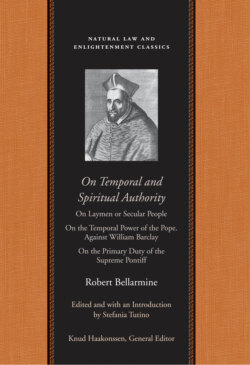Читать книгу On Temporal and Spiritual Authority - Robert Bellarmine - Страница 19
На сайте Литреса книга снята с продажи.
CHAPTER 5 The same is defended from the final cause of political authority
ОглавлениеThe third reason is drawn from the final cause. The political authority is so natural and necessary to humankind that it cannot be removed without destroying nature itself. In fact, by nature man is a social animal [animal sociabile]; whereas the brutes certainly are instructed by nature to be individually self-sufficient, man needs so many things that he absolutely cannot live by himself. In fact brutes are born clothed and armed, and they have an instinct for everything that is good for them, so that naturally and without anybody teaching them, they immediately know how to build nests, search for food, and provide themselves with medicines; but man is born without clothes, without a home, without food, lacking everything, and even though he has hands and reason with which he can produce all tools, nevertheless each thing requires such a long time that it is impossible that one man can be self-sufficient in everything, especially since we are born unskilled and the skills are learned more by instruction than by experience; therefore it is necessary for us to live together and help one another.
Moreover, even if man were self-sufficient insofar as living is concerned, he would still never be self-sufficient in protecting himself from the attack of beasts and thieves: for protection it is necessary to come together and to oppose the attack with joint forces. And even supposing man were self-sufficient against enemies, he would still remain unskilled and ignorant of knowledge, justice, and many other virtues, despite that we are in fact born expressly to exercise our mind and will. In fact, knowledge and skills were developed over a long time and by many, and they cannot be learned without a teacher; and justice cannot be exercised except in a society, since it is the virtue that establishes what is fair among many.
Finally, to what purpose would man be given the gift of speaking and listening, that is, of distinct understanding of words, if he must live by himself? Therefore in Politics, book 1, chapter 2, Aristotle rightly says that man is by nature a civil animal [animal civile], more than the bees and the cranes and any other animal, and whoever lives in solitude is either a beast or a god, that is, either less or more than a man. And our hermits are not an exception to this, for those who lived in complete solitude, such as Paul the first hermit, Mary Magdalene, Mary of Egypt, and others, can be said to have been something more than man, not by nature but by grace, as they were fed—not without miracle—by God, as is well known. Others, however, even if they lived in solitude, nevertheless got together frequently, and they were subject to their abbots, as we demonstrated in our disputation De monachis.
Now then, if human nature requires a social life, certainly it also requires a government and a ruler, as it is impossible that a multitude can last long unless there is somebody to hold it together and be in charge of the common good. As with each of us, if there were no soul holding together and unifying the parts and forces and conflicting elements out of which we are made, everything would immediately disintegrate. Hence Proverbs 11: “Where no counsel is, the people fall.”46 Thus, a society is an ordered multitude, and a confused and dispersed multitude is not called a society. What is order but a line of inferiors and superiors? Therefore we must necessarily have rulers, if a society is to be.
Because of this necessity of human nature, the third argument of the Anabaptists is disproved, as they assume what is false when they say that a political government was permitted to the Jews because of their imperfection, while it is not appropriate for us because “our anointing teacheth us of all things.” For this anointing teaches first of all that it is necessary to have a ruler, and it is not necessary to know everything, for it is also necessary to do and produce many things which we cannot do without the help of others.
And moreover, from my discussion it is inferred that it is false when Cicero, in the first book of De inventione, writes that there was a time when men wandered like beasts and then were convinced by the force of a wise man’s eloquence to assemble and live together. Indeed, those who want to praise eloquence use this argument even now. But in reality there was never such a time, nor could there be, for Adam was a very wise man and without a doubt he did not allow men to wander like beasts; and Cain, his son, even built an actual city, and before Cain and Adam there was no man. But it is not surprising that Cicero and other pagans say such things. The pagans thought that the world existed eternally, but they saw that all the crafts were new and were recorded for only a few years, so they suspected that for a very long time men had lived like beasts and that there was a record of the things accomplished only from the time when men started to live together. But it is certainly surprising that Christians, who learn from God’s testimony that the world was not yet created six thousand years ago, and that the first men immediately started to have cities, dare to say that for a very long time men lived like beasts without a ruler and without cities.47
